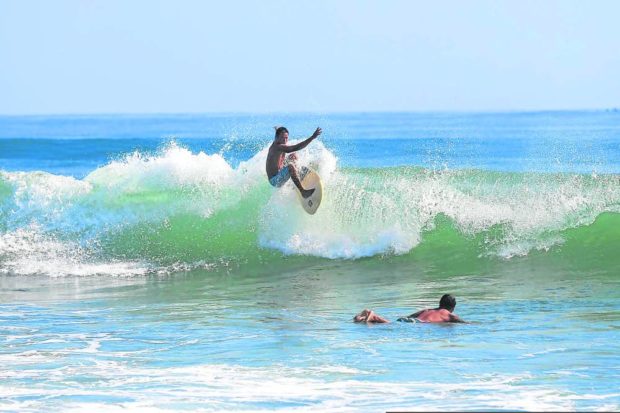In Aurora, travel curbs lifted as COVID-19 cases drop

WAVE RIDER Local surfers ride the waves in Baler, Aurora, in this photo taken on February 4, 2022. Aurora, popular for its surfing spots, beaches and ecotourism destinations, is expecting an influx of visitors as restrictions for leisure and business travel have been eased due to the improving COVID-19 situation in the province. —REM ZAMORA
MABALACAT CITY — The provincial government of Aurora has lifted all forms of travel restrictions for visitors who wanted to enter the coastal province for business, personal and leisure purposes as the number of active COVID-19 cases dropped to only five on Wednesday.
In an executive order issued on Monday, Gov. Gerardo Noveras said allowing travelers to freely enter the province was in line with the Inter-Agency Task Force for the Management of Emerging Infectious Diseases’ guidelines for areas under the most lenient alert level 1.
Noveras said documentary requirements, including vaccination cards or certificates, would no longer be required for all travelers entering and leaving the province, as he also directed policemen stationed at all local control points to stop issuing travel pass slips.
But vaccination cards would be required when entering enclosed business establishments in the province, the Inquirer learned.
Despite easing travel rules, Noveras asked the public to continue observing minimum health standards and protocols, like physical distancing and wearing of face masks, as a precaution against the spread of COVID-19.
Article continues after this advertisementThe governor also called on all municipal governments in the province to issue localized guidelines on the prevention, detection, isolation and quarantine, and vaccination related to COVID-19.
Article continues after this advertisementRisk level
According to OCTA Research, Aurora has already been classified as “very low risk” for COVID-19 transmission since Feb. 25 due to the slow growth rate of infections in the province.
On Wednesday, the provincial government registered a single new COVID-19 case, two recoveries and zero deaths.
Since the pandemic started in 2020, Aurora has recorded a total of 4,207 COVID-19 cases, of which 3,957 had recovered and 245 had died.
It was on Feb. 15 when Noveras began relaxing the requirements for travelers by scrapping the need for negative reverse transcription-polymerase chain reaction test results from people entering Aurora.
At that time, visitors and returning residents were only required to present vaccination cards or certificates and government-issued identification cards before they could be allowed entry into the province.
All health and disaster response personnel assigned to man the province’s entry points in the towns of Maria Aurora, Dingalan and Dipaculao were also recalled as part of the looser entry requirements last month. —JUN A. MALIG
RELATED STORIES
DOT upbeat on tourism growth with eased COVID restrictions
Aurora’s COVID-19 cases drop to 7